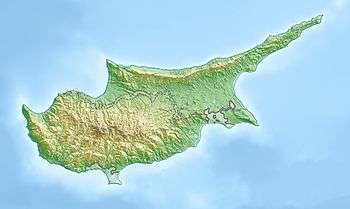Potamia, Cyprus
Potamia (Greek: Ποταμιά, Turkish: Potamya, Bodamya and Dereliköy) is a village in the north-east of Cyprus in the district of Nicosia, close to the Green Line separating it from the area of the breakaway, unrecognised Northern Cyprus. Together with Pyla and Rizokarpaso, Potamia forms one of the few remaining ethnically mixed communities in Cyprus, made up of Greek and Turkish Cypriots.
Potamia | |
|---|---|
| Ποταμιά (Greek) Potamya (Turkish) | |
 Potamia Location in Cyprus | |
| Coordinates: 35°2′31″N 33°26′42″E | |
| Country | |
| District | Nicosia District |
| Population (2001)[1] | |
| • Total | 415 |
| Time zone | UTC+2 (EET) |
| • Summer (DST) | UTC+3 (EEST) |
History
Here lie the remains of the Royal Residence of King Peter II (1369-1382), destroyed by the Saracens in 1426. When the site was visited by Rupert Gunnis in 1936, only a portion of the walls, a large vaulted room with fragments of frescoes, remained.[2]
Prior to the inter-communal conflict and the Turkish invasion of Cyprus of 1974 the village had a Turkish-Cypriot majority, however most Turkish Cypriots have subsequently emigrated to Northern Cyprus, and now the village is mostly inhabited by the remaining Greek-Cypriots. Nonetheless, the village has a history of co-existence between the two communities, and Greek and Turkish Cypriots still live side by side. Recently there has been some lobbying to convince Turkish Cypriots to return, and some have done so.
Culture
There is widespread bilingualism and cooperation between the two communities, and the village has both a Greek and a Turkish-Cypriot mayor who work together. In line with the bi-communal character of the village, it is the home of Radio Potamia, an FM radio station that broadcasts equally in Greek and Turkish. These broadcasts reach both northern and southern Cyprus, with the stated aim of promoting mutual understanding and respect between the communities.
The former Royal Palace
Potamia was a Royal residence of the Lusignan Dynasty and was inhabited by the Queen of Cyprus, Catherine Cornaro. The village which is in the near of the capital of Cyprus, Lefkosia is the place of a Palace of the Kings of Cyprus, which is still standing. In October 2011, the Cyprus Antiquities Department announced Caterina Cornaro's partially ruined summer palace in Potamia would be renovated in a one million euro restoration project, becoming a cultural centre.[3] Today (2017) the palace still decays. Despoliations are known.[4]
References
- Census 2001
- Gunnis, R. (1936) Historic Cyprus: A Guide to its Towns & Villages Monasteries & Castles (Nicosia, K Rustem & Bro), p.400
- Demetra Molyva, 'Palace of Cyprus’s last queen to be restored' in The Cyprus Weekly (Cyprus newspaper), 7 October 2011
- Di Cesnola, L. P. Cyprus: Its Ancient Cities, Tombs, and Temples, 2015.
